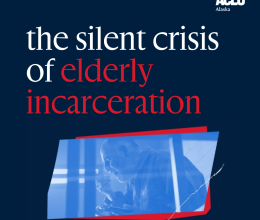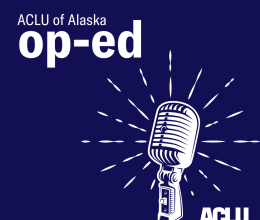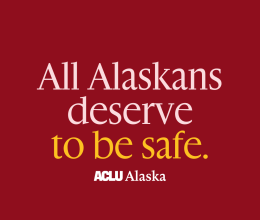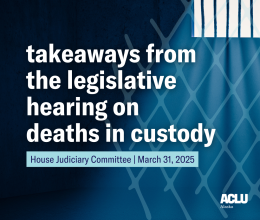
With less than two weeks left in Alaska’s legislative session, lawmakers are considering a package that would erode constitutional protections in the state’s criminal legal system.
The Senate Judiciary Committee recently unveiled a version of House Bill 66 that combines multiple bills that the legislature has debated over the last two years. We break down the details below, but overall, it is an omnibus bill that makes sweeping changes and doubles down on the state’s “lock them up and throw away the key” strategy to public safety.
The Alaska legislature has less than two weeks left in its regular session. The things the bill is billed as addressing — the state’s overdose death crisis, gaps in Alaska’s civil commitment system that have led to harm, and trauma that criminal proceedings create for victims — are important. But the way this omnibus goes about it is severely misguided and will leave Alaskans worse off.
Here’s why:
- HB 66- Drug-induced homicide. HB 66 was crafted in an attempt to reduce the overdose deaths that are ravaging the state by charging people who distribute drugs that lead to death with murder. It relies only on a punitive strategy that will not reduce overdose deaths but will reduce resources the state can use for more effective strategies. Focusing on substance misuse prevention, ensuring that all Alaskans have access to high-quality treatment, and recovery support are more effective strategies that recognize this crisis for what it is — a crisis of public health.
Increasing penalties may have the opposite effect as intended. In jurisdictions where legislation like HB 66 has been passed, overdose deaths increased as people are hesitant to call for help. The ACLU of Alaska opposes HB 66 because Alaska must prioritize its resources for the public health and law enforcement strategies that are shown to work in reducing overdose deaths.
- HB 53 — Involuntary commitment. This provision establishes a framework that would allow a person to be subject to an involuntary commitment period of two years, prohibit petitions for early discharge prior to 180 days of an initial commitment order, and require court approval of a doctor’s discharge decision. Committing someone to a psychiatric facility against their will in this manner impermissibly curtails their liberty and violates constitutional rights to due process under both the United States and Alaska Constitutions.
If passed, this bill will effectively warehouse mentally ill Alaskans and long-term commitments will exacerbate Alaska’s psychiatric facility capacity crisis.
- SB 65 - Hearsay in grand juries. This provision would allow hearsay to be included in all grand jury proceedings, which are used to determine whether the state can prosecute a felony charge. Currently, there are some circumstances in which hearsay is accepted, for example, if a child is a witness or victim of a crime. Prohibiting hearsay from being included in a grand jury is an important safeguard against misguided prosecution. A grand jury must exercise its function of ensuring the state has sufficient evidence to require a person to stand trial for a serious criminal charge.
The provision in this omnibus would swing the door wide open to hearsay. While it’s important that Alaska reduce the trauma that people experience in the criminal legal system, this change rests on the idea that everybody who is brought before a grand jury is already guilty. If the state can present hearsay in essentially any case, they do not hear the firsthand witnesses, but instead receive only hearsay.
Instead of further criminalizing drug use, the ACLU of Alaska urges the legislature to strengthen Alaska’s Good Samaritan statutes to reduce overdose deaths. These statutes provide immunity from prosecution for certain charges of possession of a controlled substance when a person seeks assistance for someone experiencing a drug overdose. This type of protection can help save lives, especially when backed by strong public and law enforcement awareness, by reducing hesitancy to call first responders. The ACLU of Alaska urges the legislature to remove both involuntary commitment and grand jury provisions from the bill because of their disregard for Alaskans’ constitutional rights.
The problems that motivated many aspects of HB 66 need to be addressed; they have harmed too many people and Alaskan communities. However, the solutions that have been put forward in this bill are misguided, lack critical evidence, and carry significant constitutional concerns. The ACLU of Alaska will continue to monitor and track this bill as the legislature comes to a close in May.


